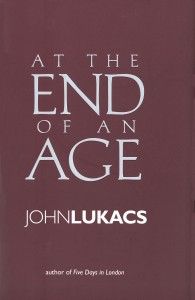From the Highlighter

At the End of an Age, John Lukacs (Yale, 2002)
I picked up this book when it was published in 2002. I always think octogenarians have something interesting to say, and I figured an octogenarian of Lukacs' stature would definitely have insights.
But he's not writing about the end of his age. He's writing about the end of the age that “began about five hundred years ago.” For the chronologically-challenged, that means he's writing about the end of the age that began with the exploration of the New World (1492) and the Protestant Reformation (1517).
Readers of this blog know I think Peter Schiff (“Dr. Doom”) says prescient things. Even though he's an investment adviser, he speaks in Lukacsian terms: We're at the end of an age. America's hegemony is falling . . . fast. Crashing? Maybe, but probably more like a hissing tire leak. At this point, it's only economic, but the cultural will follow (did I read recently that a westernized Muslim city is billing itself the Hollywood of the Middle East?), as will the martial. Schiff merely looks at the big picture and tries to give advice that matches it.
The problem with Schiff is that he's trying to time a collapse that Lukacs felt back in 1970 (when he published The Passing of the Modern Age). The collapse could–will, I think–take a hundred years. But I also think it started in the 1970s, so we're already forty years into it. Thing is, if you had scrambled out of American stocks back in the 1970s, you would've missed out on a lot of money.
Investment people refer to those years from the late 1970s to the early 2000s as a “secular bull market,” but I think it's misleading. When people hear “bull market,” they think “good market, good economy.” During that 25-year period, we dissipated our manufacturing base, spent all our cash, fell into debt, and forgot how to do things for ourselves. NYSE-wise: Definitely a secular bull market. General economy: Bearish to an extreme.
It's a topsy-turvy age. It's the end of an age. Things won't be the same. The old terminologies won't quite fit. There will be bear stock market rallies in the secular bear market for the next thirty years. I wouldn't be surprised if some of these “rallies” last five years or more, which would then cause them to resemble a bull market rather than a mere bear rally.
At the end of this age, the “bull” and “bear” terminologies are still helpful, but are just as likely to mislead. The stock market geeks that study P/E ratios are still smart and have useful things to say, but they're likely to screw up because they don't see the world and they don't have that general level of learning that the liberal arts used to impart. They don't know history and philosophy and the macro things that drive human life.
They can analyze the water, but they can't tell that we're floating toward a waterfall.
But as Lukacs makes clear in this book, it's not necessarily a mortal waterfall. Things will change, yes, but they won't necessarily be worse. The change will be painful. Of that, I'm certain. But things will get better. John Paul II held out great hope for the coming age. He said we were crossing the threshold of hope. I think it's safe to say that he wasn't referring to a glorious age for America. His scope was hardly that narrow. I think he had a mystic vision of a worldwide renewal, of which America will be merely one player among many.
That's not a bad thing.
I think bad times are coming for America. It's the end of the American Age that “began about five hundred years ago” and was marked by the steady–at times, stratospheric–rise of America's economic, then cultural, then military world presence. The American Age will fittingly be marked by the decline of America.
I wouldn't be surprised if the bad times hit in the next two years. But I also wouldn't be surprised if they don't hit for another thirty. Just as I think it's very hard to time the stock markets and investments at the end of an age, I also think it's ridiculous to time your life at the end of an age. This is not the time to stop having children or pack up and move to Australia. There might be 25 good years ahead of us. We might fall on hard economic times, but regain a sense of fundamentals that made America great to begin with, and then things might bloom. No one really knows. We can only tend our own garden, keep our eyes on the lamp that lights our feet. Yes, it helps to look up now and then and see what's going on in general. Indeed, the man with a family to feed and nourish is called upon out of duty and prudence to look up frequently. But overall, day to day, minute to minute, work quietly.
And pray.
The passages will follow later this week.
